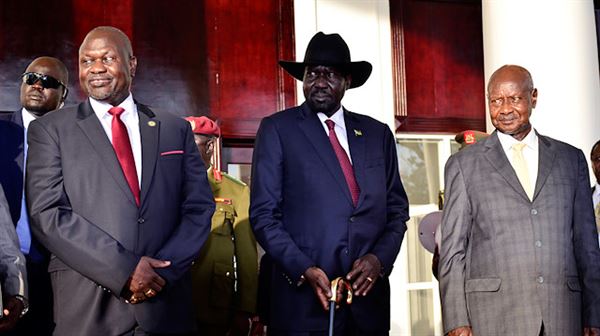The reaction has been mixed among South Sudan's warring parties to a 100-day extension for the formation of a transitional government of national unit
The reaction has been mixed among South Sudan’s warring parties to a 100-day extension for the formation of a transitional government of national unity.
While some welcomed it despite being ready to form a government on Nov. 12, the leader of the Sudan People’s Liberation Movement-In-Opposition (SPLM-IO), Riek Machar, had specifically asked for the extension of the deadline to form a power-sharing government in order to resolve outstanding disagreements.
But Tut Gatluak, South Sudan’s presidential adviser on security affairs and head of the national pre-transitional committee responsible for implementing the peace agreement, said the 100-day extension is only meant for security arrangements.
“All forces will be ready to report to cantonment areas and the extension will not be delayed further,” he said.
He said the extension period is only for screening, training and verification of forces and is not related to any other arrangement.
Presidential spokesperson Ateny Wek Ateny confirmed that the extension was requested by Machar.
“We were almost ready to form the government, but Machar requested a 100-day extension. If there is any room for doubt, it should be addressed by the SPLM-IO.”
“If the SPLM-IO will not be able to come or accept the formation of a government within 100 days, then it is they [who will tell us what they want]. But on our part, we cannot extend it beyond 100 days.”
President Salva Kiir and opposition leader Machar were expected to form a unified transitional government by Nov. 12, in line with a September 2018 peace deal aimed at ending six years of conflict.
But following a meeting last week in Uganda held under the auspices of the regional body IGAD, the leaders and stakeholders agreed to extend the pre-transitional period by 100 days to allow critical tasks to be completed.
President Kiir said he accepted the extension to avoid the risk of returning to war.
Puok Both Baluang, the director for information and public relations for the SPLM-IO, said they welcome the extension.
“At the onset, we welcome the extension of the pre-transitional period for 100 days to give room for the implementation of critical and fundamental things such as the security arrangements and the boundaries and number of states,” Baluang told Anadolu Agency.
He said they support the new extension because it will prevent a return to war and create a conducive environment for implementing the critical outstanding issues of the Revitalized Agreement on the Resolution of the Conflict in the Republic of South Sudan, or R-ARCSS.
“It is in the interest of the people of South Sudan and will assist in alleviating their suffering, which will only happen when the government in Juba develops a genuine will and accepts to implement the provisions of the agreement in letter and spirit.
“There are no reservations. What we are demanding ahead of the formation of the revitalized unity government is to insure that proper security arrangements are in place and the boundaries and number of states are permanently determined. The aforementioned issue is in the context of the signed revitalized agreement,” he said.
He urged the guarantors of the R-ARCSS to adapt drastic measures to ensure that the 100 days will not face the same fate as the pre-transitional period and extended pre-transitional period of the revitalized agreement, which passed without much having been achieved.
“I as your president had to accept the 100-day extension to avoid the potential of the SPLM-IO returning the country to war again,” Kiir told the media upon arrival at Juba International Airport from Kampala, Uganda.
South Sudan slid into crisis when Kiir sacked Machar as vice president in December 2013 on suspicion of plotting a coup, followed by a protracted civil war that claimed the lives of tens of thousands of people and forced 4 million people to flee their homes.
Before the 2018 peace deal, five years of fighting between the two leaders crippled the country, with millions displaced and almost 400,000 people dead from violence and disease.
